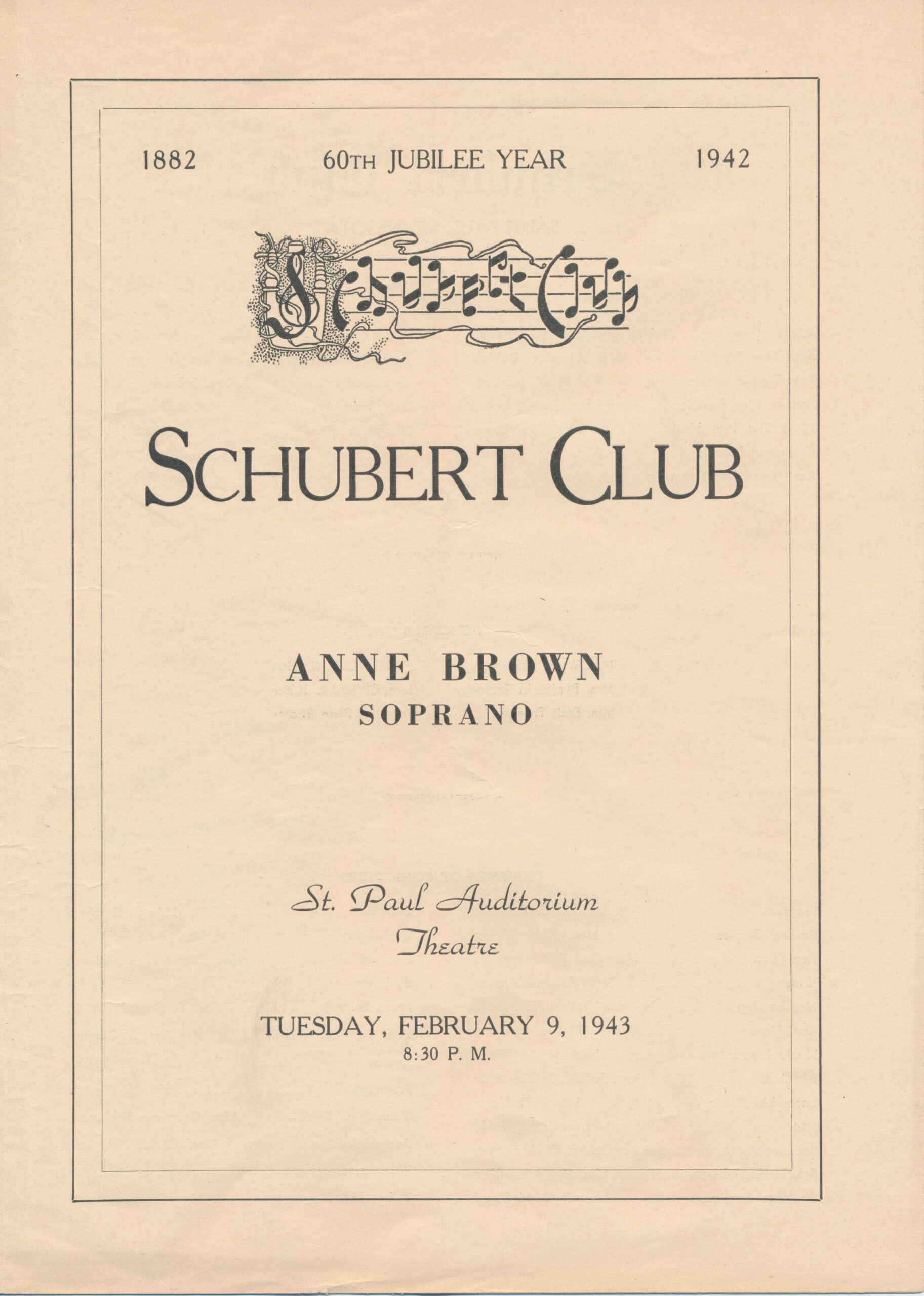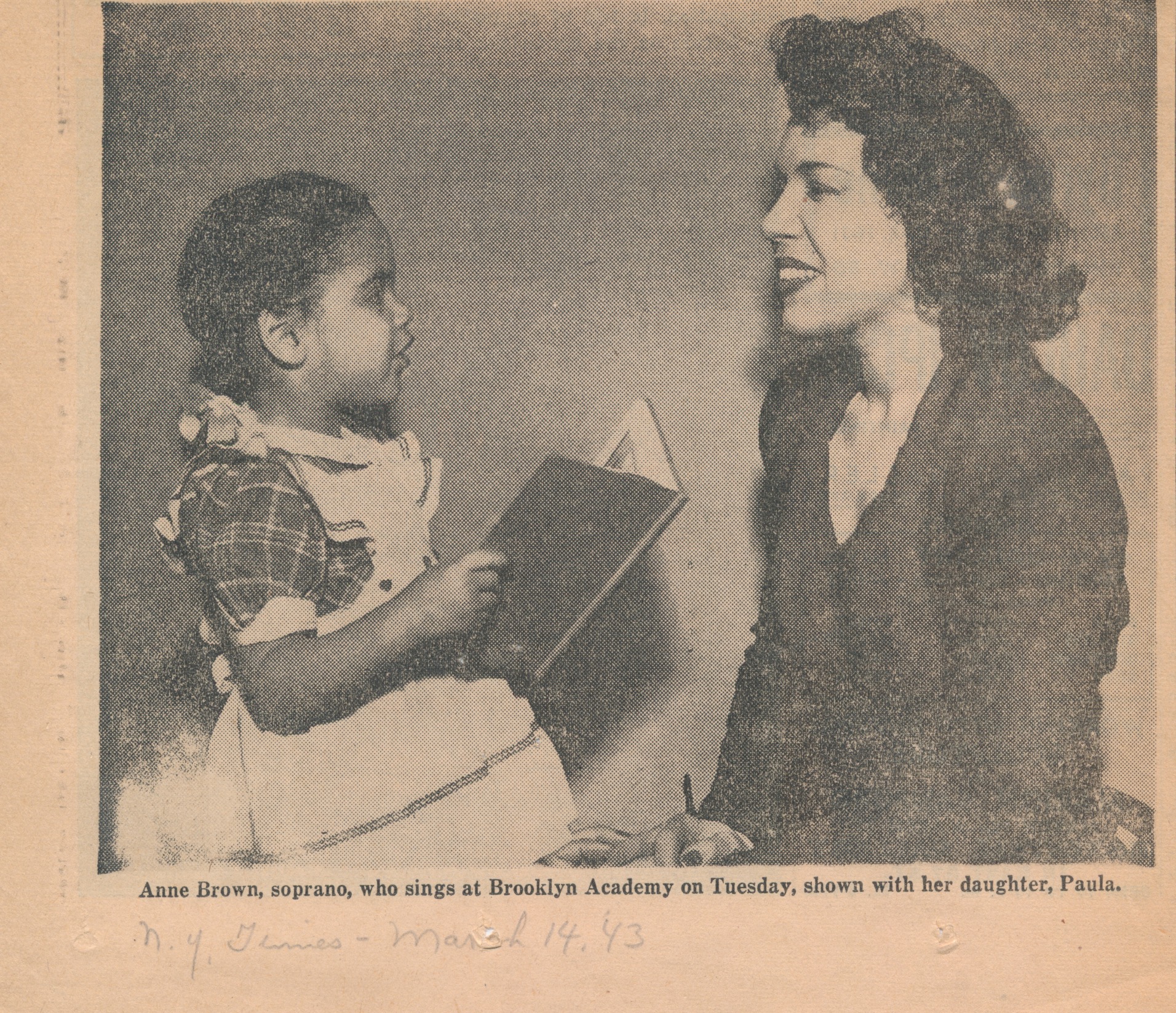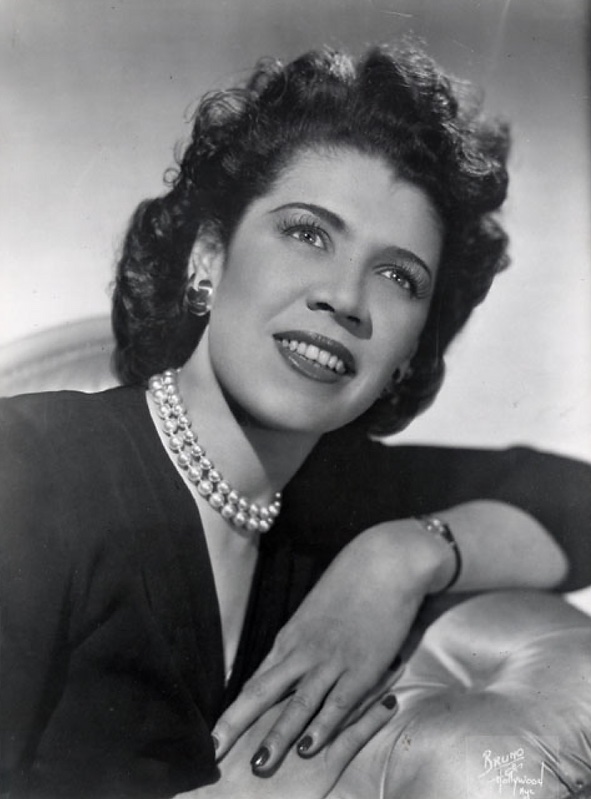From the Schubert Club Archive:
The eldest daughter of what she called a “terribly conservative middle-class black family”, Anne Brown grew up in a West Baltimore neighborhood then home to the city’s segregated black elite. A powerful music-loving Baltimorean encouraged her to apply to the Juilliard School in New York. At the age of only 16, she became the first black student ever admitted to that conservatory. In 1933, while still at Juilliard, she read that George Gershwin was composing an opera entitled Porgy about African Americans in Charleston. She decided to write to him. The composer promptly invited her to audition: “I had brought songs by Schubert, Brahms and Massenet, and I also had one of his own songs, ‘The Man I Love,’ to perform for him.”
Gershwin listened politely, then asked if she could sing a Negro spiritual. At first, Anne Brown bristled: “Why is it that you people always expect Black singers to sing spirituals?” But from his expression she could see that Gershwin understood her resentment of the stereotype she was defying. “Then I wanted more than anything else to sing a spiritual for this man,” she recalled, “because I loved spirituals, my mother had sung them, and I sensed that he loved them, too. So I sang ‘A City Called Heaven’, unaccompanied and with my whole soul, as a thank-you to George Gershwin. Afterward, he said, ‘Wherever you go, you must sing that spiritual. It is the most beautiful one I have ever heard.’” He then gave her the part of Bess. Here is Anne Brown performing “City Called Heaven,” from an album of spirituals she recorded for Mercury in the 1940s:
Not only did Gershwin give Brown the starring role in his new opera, he was inspired by her to change its title: “In our last days of rehearsals in New York before heading up to Boston for previews,” she related, “George took me to lunch. ‘Come on,’ he said, ‘I’m going to buy you an orange juice. ‘Then, when we were seated, he made this announcement. I remember his words exactly because they thrilled me so. ‘I want you to know, Miss Brown,’ he said, ‘that henceforth and forever after, George Gershwin’s opera will be known as Porgy and Bess.”
The production opened in New York in October 1935, to muted, conflicting reviews. Many African Americans, including Brown’s father, were disturbed by what they saw as the depiction of old black clichés – drug peddlers, loose women etc. – but Anne Brown firmly believed that “DuBose Heyward and Gershwin had simply taken a part of life in Catfish Row, South Carolina, and rendered it superbly.” Porgy and Bess ran for 124 performances, followed by a national tour with stops in Philadelphia, Pittsburgh, Chicago and, lastly, at the National Theatre in Washington DC. Brown was livid when she found out – she knew that theatre was segregated: “I told them I will not sing at the National. If my mother, my father, my friends, if black people cannot come hear me sing, then count me out. I remember Gershwin saying to me, ‘You’re not going to sing?’ And I said to him, ‘I can’t sing!’” After long- drawn-out negotiations, the National agreed to integrate, but as soon as the curtain fell on the final performance of Porgy and Bess, the theatre reinstated segregation.
Brown sang in a number of revivals of the opera in subsequent years and recorded highlights for Decca in the early 40s. She was also featured in the 1945 Hollywood Gershwin biopic Rhapsody in Blue, singing “Summertime” (re-arranged to include chorus) in an extended sequence recreating the original production’s opening scene:
In February 1943, the Schubert Club presented Anne Brown in recital at the St. Paul Auditorium. Writing in the Pioneer Press, critic Frances Boardman proclaimed her a “singing artist of such superlative gifts and craftsmanship as seldom adorn any concert season more than once, if at all.” But her visit to Minnesota wasn’t all smooth sailing. Prejudice reared its ugly head when the artist’s sponsors tried to secure a room for her in one of St. Paul’s hotels. And there was said to be complaints when a Schubert Club member (1942/43 was the last season in which the organization actually was a club with membership), a local music teacher, offered her tickets to the recital to 14-year-old black music student and her mother. Schubert Club officers tried to counteract those attitudes by engaging the baritone Todd Duncan, Porgy to Brown’s Bess in the original production. He appeared the next season in St. Paul.
Artist Note by Richard Evidon

Cover of the program from Brown’s 1943 concert at St. Paul Auditorium
Click to View Full Image
Promotional flyer for Brown’s 1943 concert
Click to View Full Image
Picture of Brown with her daughter Paula, featured in the New York Times in 1943, the same year as her Schubert Club performance
Click to View Full Image

